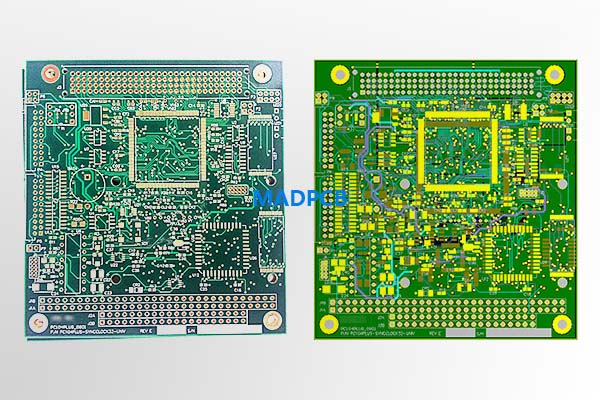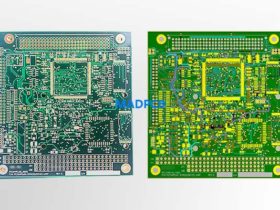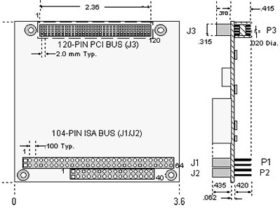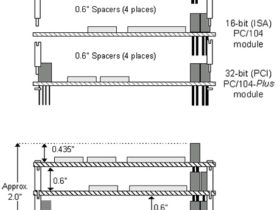PC104 Plus Printed Circuit Board Manufacturer
PC104 Plus Printed Circuit Board Manufacturer
- Layer Count: 4 layers
- Material: ITEQ IT-170GRA2TC (Halogen-free FR-4 Tg175, 94V-0)
- Finished Board Thickness: 1.2mm +/-10%
- Solder Mask: Green x2
- Silkscreen: White x2
- Unit Size: 90.17*95.89mm
- Panel Size: N/A
- Finished Inner Copper Weight: 1oz
- Finished Outer Copper Weight: 1oz
- Surface Finish: ENIG (Au: 2-3μ”, Ni: 120-240μ”)
- Press-Fit Vias: Yes
What’s PC104 Plus?
Purpose
The PC104 Plus specification establishes a standard for the use of a high-speed PCI (Peripheral Component Interconnect) bus in embedded applications. Incorporating the PCI bus within the industry PC104 form-factor brings many advantages to its users, including fast data transfer over a PCI bus, low cost due to PC104’s self-stacking bus, and high reliability due to PC104’s inherent ruggedness.
Background
A PCI-enhanced version of PC104 was developed by Ampro Computers, Inc. (Sunnyvale, Calif) and offered to the PC104 Consortium in September 1996. The Consortium formed a working group to review and finalize the specification, and PC104-Plus was subsequently approved by the Consortium’s voting members in February 1997.
The main objective in defining an addition of PC104 was to preserve the attributes that have mad PC104 so successful in embedded applications, namely:
- Compact …………………………………..3.6 by 3.8 inches (90 x 96 mm) module size
- Self-stacking ……………………………..expands without backplanes or card cages
- Pin-and-socket bus connector……….reliable in harsh environments
- Four-corner mounting holes ………….resistance to shock and vibration
- Low power consumption ………………low power consumption and low heat generation
- Fully PC compatible …………………….reduced development costs and fast time-to-market
- In addition, it was important that the new embedded form of PCI also be . . .
Stackable and usable along with standard PC104 modules (in the same stack)
This added requirement enables newly designed PC104 Plus modules to be used in conjunction with the wide variety of preexisting PC 104 “legacy” modules.
Since the 104 pins of the standard PC 104 bus connectors are fully occupied with the signals of the “ISA” (PC/AT) bus, a new 120-pin stackable connector was needed to handle the additional signals of the 32-bit PCI bus. A 120-pin high-density (2mm) connector that precisely matches the stacking and other dimensional requirements of PC104 was developed. A unique connector pin “shroud” was also created, to: (1) guide the male portion of the PCI connector as it mates with the female portion of the next connector in the stack; and (2) protect the PCI connector pins, which are slightly thinner and therefore somewhat more vulnerable than those of the ISA connector.
The resulting combination of PC104 with PCI, called “PC104-Plus,” meets all the objectives listed above. In addition, extensive simulations have been used to validate its reliability for both current 33 MHz PCI bus chipsets and future 66 MHz PCI silicon.
PC104-Plus Specification Overview
The figure shows the basic mechanical dimensions of a PC104 Plus module. The module’s form-factor matches that of PC104, so PC104 Plus can be said to be “PC104 form-factor compliant”. The new self-stacking 120-pin high-density (2 mm) PCI bus connector fits between the standard PC104 mounting holes along the edge opposite the regular PC104 (ISA) bus, so it consumes minimal space (approximately 10%).
Here is a brief summary of the basic specs of PC104 Plus modules:
- Module dimensions …………………………………………3.575 x 3.775 in. (same as PC/104)
- Spacing between stacked modules ……………………0.6 in. (same as PC/104)
- Data throughput (max.) ……………………………………132 Mbytes/sec (26 x PC/104)
- Bus drive current (min.) …………………………………….3 mA (most signals)
- Bus load current (max.) ……………………………………700 μA
- Number of PCI modules per stack (max)……………..5 (includes “base” CPU module)
Figure 2 illustrates a typical PC104 Plus stack. 8- and 16-bit PC 104 (ISA) modules can be stacked along with 32-bit PC104 Plus (PCI) modules, provided that similar type modules are adjacent to each other. This results in maximum system expansion and configuration flexibility.
PC/104-Plus, like PC 104, is essentially a repackaged version of PCI that is optimized for the unique requirements of embedded systems — where space is scarce and ruggedness is paramount.
Although PC 104-Plus modules provide connectors for both buses, the “120-pin PCI bus” and the “104-pin ISA bus,” only the PCI bus usually connects to circuitry on such a module. The ISA bus connectors are only there to pass the ISA bus on for possible use by the next module in a stack.
Current status of the PC104 Plus standard
PC104 Plus shows every indication of following in the footsteps of its predecessor. Numerous companies have announced support or begun development programs based on PC 104 Plus. Products being developed include high performance single-board computers, full-motion video interfaces, high speed LANs, communications interfaces (100BaseT, USB, IEEE-1394, etc.), high performance data acquisition and control interfaces, and PCI bus adapters and bridges.
Copies of the PC104 Plus Specification are available at no charge to individuals and companies developing embedded systems. For further information, contact the PC104 Consortium.
Comparison of PCI Form-Factors
|
Desktop PCI |
Passive Backplane PCI |
PMC | Compact PCI | Small-PCI |
PC 104-Plus |
|
| Dimensions (in.) | Long: 12.3 x 3.9 Short: 6.9 x 3.9 |
12.3 x 3.9 |
5.9 x 2.9 | 6.3 x 3.9 | 3.4 x 2.1 |
3.8 x 3.6 |
| Area (sq. in.) | Long: 48 Short: 24 |
48 |
17 | 25 | 7 |
13 |
| Bus Connector | Edge-Card |
Edge-Card |
Pin & Socket | Pin & Socket | Pin & Socket |
Pin & Socket |
| Includes ISA bus |
No |
Yes | No | No | No |
Yes |
| Installation Plane |
Perpendicular |
Perpendicular | Parallel | Parallel |
Parallel |
|
| Expands Without Additional Slots (Self-Stacking) |
No |
No | No | No | No |
Yes |
| Positive retention |
No |
No | Yes | Yes | No |
Yes |
| Standards Body |
PCI-SIG |
PICMG | IEEE | PICMG | PCI-SIG |
PC 104 |
| Primary Application Area |
Desktop: motherboard expansion |
Industrial: backplane expansion |
Industrial: VME mezzanine |
Industrial: backplane expansion |
Laptop: factory options |
Embedded: |




